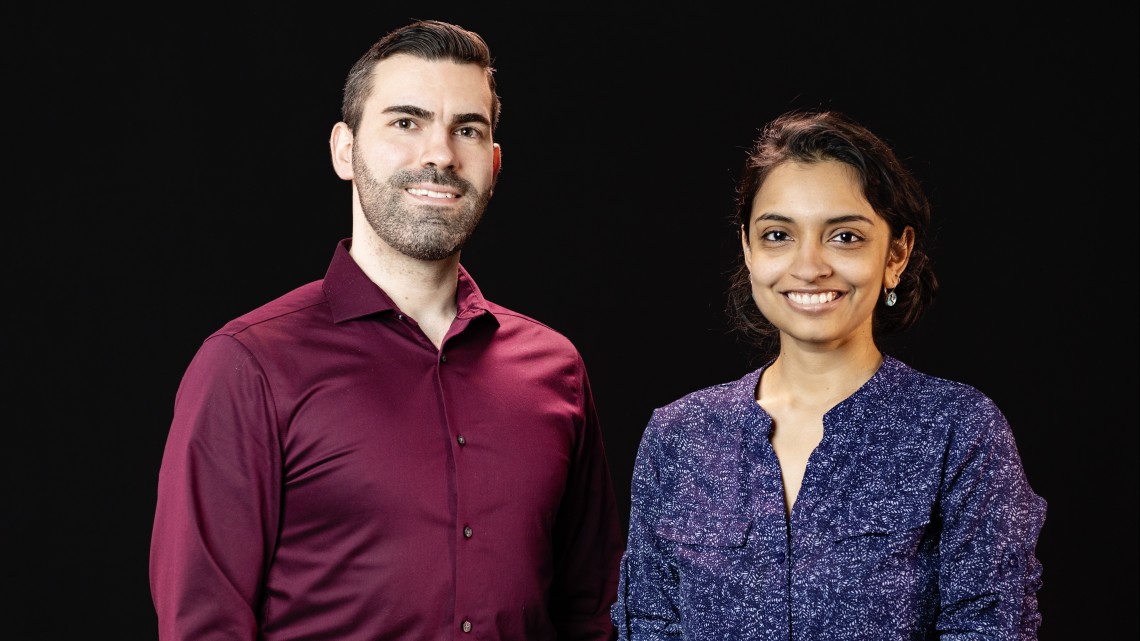
2021-22 Cornelia Ye Outstanding Teaching Assistant Award winners Janani Hariharan and Zachary Grobe.
News directly from Cornell's colleges and centers
Cornelia Ye award winners engage students with interdisciplinary teaching
By Dave Winterstein
The Center for Teaching Innovation (CTI), along with a committee made up of faculty and students, has selected doctoral students Janani Hariharan and Zachary Grobe as recipients of the 2021-22 Cornelia Ye outstanding teaching assistant award.
“Their commitment to interdisciplinary approaches and engaging all students in a welcoming environment made our two winners rise to the top of a strong group of candidates,” said Mathew L. Ouellett, executive director of the CTI.
Hariharan, a PhD student in Soil and crop sciences, first became interested in teaching through her experience taking the Intergroup Dialogue Project program.
After participating in the program, Hariharan trained and worked as an IDP facilitator. She then further honed her skills through programming from the CTI and the Graduate School’s Future Faculty and Academic Careers office.
As a facilitator, Hariharan found special motivation in building rapport with students.
“I really enjoy working with students in lab sections,” said Hariharan. “In the lab, interactions with students can be more unstructured than in typical classroom settings and that alleviates some of the power dynamics in lecture-based teaching.” She added that these types of interactions really bring science alive for the students.
With her own research at the intersection of ecology and microbiology, Hariharan also brings an interdisciplinary focus to her teaching.
“In real life the lines between disciplines are blurred, and it’s important to remove those silos,” Hariharan said. “I seek to find ways to help students take charge of their own learning and understand that the class is not just me giving them information, but also constructed through their questions and the topics that interest them.”
“In the future, I’m interested in creating course-based undergraduate research experiences,” said Hariharan. “As a researcher, I often explore complex, long-term projects, but by breaking the ideas up into smaller pieces, we can give students a taste of what we do and what research can be like.”
Grobe, a PhD student in English language and literatures, also takes an interdisciplinary approach to teaching spurred by his research focusing on documentary poetry and film. He seeks to create safe environments where students can experiment with ideas.
“Our students feel welcome to test new ideas when they trust that their peers and I will listen attentively and respond thoughtfully,” said Grobe, “and I try to design my courses such that the goal of each class is not to arrive at a ‘correct’ interpretation but rather to develop ways of thinking more expansively about a text or concept.”
Through this broad approach, Grobe values coming up with more holistic or challenging perspectives rather than arriving at a final answer. He emphasizes experimenting rather than a more solution-oriented lesson.
“Often what characterizes our experiments in class is incorporating our different disciplinary backgrounds to inform how we’re analyzing a text, context, or approach,” he said.
Moreover, Grobe chose Cornell for the teaching opportunities, knowing that teaching would be an important part of his career.
“Research is where I make discoveries that excite me, and that excitement helps create a more engaging classroom environment,” said Grobe. “My research helps me be a more effective instructor because I need in-depth knowledge of the texts and concepts that I teach in order to introduce them to students who may have vastly different disciplinary backgrounds.”
Mao Ye, Ph.D. ’11, established the Cornelia Ye Award in 2012 in honor of then-President David Skorton’s commitment to teaching. Ye named his daughter Cornelia, after Cornell, and the award after his daughter.
Each year, the award is given to two outstanding TAs, one domestic and one international, who have demonstrated dedication and excellence in their teaching responsibilities. The award includes a certificate and $500.
This year’s Ye Award selection committee consisted of Stephen Lee, Professor of Chemistry and Chemical Biology; David Faulkner, senior lecturer in the Knight Institute for Writing in the Disciplines and the Department of Literatures in English; Vasilis Charisopoulos, PhD student in the School of Operations Research and Information Engineering and former recipient of the Cornelia Ye Outstanding Teaching Assistant Award; Ava Leeser ’23, CTI undergraduate assistant, studying Fine Arts; Kim Kenyon, former CTI associate director and selection committee facilitator; and Aryaman Saksena ’22, CTI undergraduate assistant, studying Information Science.
Dave Winterstein is a communication specialist in the Center for Teaching Innovation.
Get Cornell news delivered right to your inbox.
Subscribe
